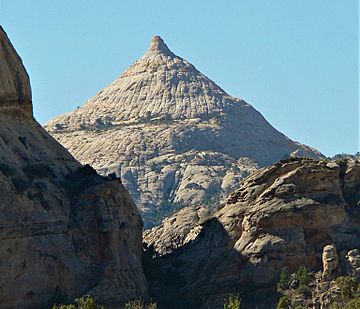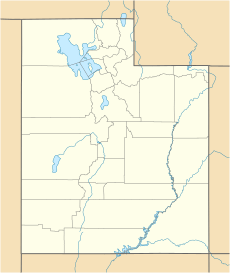Ferns Nipple facts for kids
Quick facts for kids Ferns Nipple |
|
|---|---|

Ferns Nipple, north aspect
|
|
| Highest point | |
| Elevation | 7,065 ft (2,153 m) |
| Prominence | 305 ft (93 m) |
| Isolation | 0.96 mi (1.54 km) |
| Parent peak | Peak 7100 |
| Geography | |
| Location | Capitol Reef National Park Wayne County, Utah, US |
| Parent range | Colorado Plateau |
| Topo map | USGS Golden Throne |
| Geology | |
| Age of rock | Jurassic |
| Type of rock | Navajo Sandstone |
| Climbing | |
| Easiest route | class 4 scrambling |
Ferns Nipple is a mountain peak in Capitol Reef National Park in Utah, United States. It stands tall at 7,065 feet (2,153 meters) above sea level. This famous landmark is about 4 miles (6.4 km) southeast of the park's visitor center.
Rainwater flowing off the mountain eventually reaches the Fremont River. This river then flows into the larger Colorado River. A popular story says that the mountain was named by the famous outlaw Butch Cassidy after his girlfriend, Fern.
Contents
How Ferns Nipple Formed
Ferns Nipple is made of a type of rock called Navajo Sandstone. Scientists believe this rock formed about 180 million years ago. At that time, this area was a huge sandy desert, the biggest in Earth's history!
Ancient Sand Dunes
In this hot, dry climate, strong winds blew sand around. These winds created giant sand dunes, much like those you might see in deserts today. Over millions of years, these sand dunes turned into the rock we now call Navajo Sandstone. This happened during a time in Earth's history called the Jurassic period.
The Waterpocket Fold
Long after these sandy layers became rock, the entire Colorado Plateau slowly lifted up. Usually, the rock layers stayed flat. But Capitol Reef National Park is special because of something called the Waterpocket Fold. This is a huge bend in the Earth's crust, like a giant wrinkle. It formed between 50 and 70 million years ago during a period of mountain building called the Laramide Orogeny.
Climate Around Ferns Nipple
The area around Ferns Nipple has a Cold semi-arid climate. This means it's a desert climate, but it can get quite cold in winter. The average temperature in the coldest month is below 32°F (0°C).
Rainfall and Snowfall
Most of the yearly rain falls during spring and summer. This desert area gets less than 10 inches (254 mm) of rain each year. Snowfall in winter is usually light.
Images for kids





